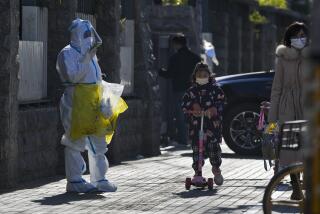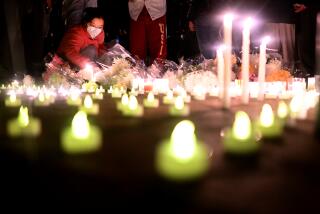Peking Officials Bring End to Sit-in : Displaced City Dwellers Rebuffed in Effort to Return
- Share via
PEKING — A weeklong sit-in at Peking City Hall by former city dwellers forced into rural areas during the Cultural Revolution ended today after city bosses condemned the protest and told them to go back to the countryside.
The group of more than 300 protesters from Shanxi province, about 200 miles west of Peking, had occupied the steps of the municipal government and Communist Party headquarters to demand urban residence permits.
They were sent to the countryside as teen-agers at the height of the Great Proletarian Cultural Revolution in 1968 to “learn from the masses,” but sought to return to their old homes as thousands of others have.
The demonstrators, aged about 35, were all gone today, as were the banners they had strung across the entrance to City Hall.
The official New China News Agency reported that Mayor Chen Xitong and municipal party Secretary Li Ximing met with a group of protesters Monday and sternly criticized them for “adopting the Great Proletarian Cultural Revolution way of doing things.”
They dismissed the group’s demands as “unreasonable from the point of view of the nation and the people, and individualist.”
The sit-in was not reported by the Chinese media until this morning, when they focused on the mayor’s condemnation of the demonstration, the first such in five years.
The news agency report said a majority of the protesters took the advice of city leaders and agreed to return to Shanxi. It did not make clear if others refused.
The mayor and party boss said the sit-in reflected the “pernicious influence” of the Cultural Revolution, when Mao Tse-tung’s Red Guards ran amok and factional fighting erupted in the streets.
The Shanxi group claimed to represent 20,000 former Peking youths still trying to get back to the city.
An estimated 16 million urban young people were sent to work with peasants throughout China during the 1966-76 Cultural Revolution. About 75% have returned to the cities, but those who married and settled into jobs are required to stay there.
More to Read
Sign up for Essential California
The most important California stories and recommendations in your inbox every morning.
You may occasionally receive promotional content from the Los Angeles Times.













